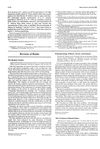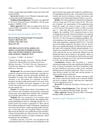
The books were useful but had some areas needing improvement.
 June 2021 in “Journal of The American Academy of Dermatology”
June 2021 in “Journal of The American Academy of Dermatology” New scale reliably assesses male hair loss with female pattern.
 November 2020 in “Skin Research and Technology”
November 2020 in “Skin Research and Technology” Videodermoscopy better identifies female hair loss than clinical diagnosis.
 May 2015 in “Journal of The American Academy of Dermatology”
May 2015 in “Journal of The American Academy of Dermatology” Minoxidil response testing helps predict hair growth success.
 January 2008 in “The Year book of endocrinology”
January 2008 in “The Year book of endocrinology” Gene variant linked to prostate cancer, hormone levels, and hair loss.
 June 2005 in “British Journal of Dermatology”
June 2005 in “British Journal of Dermatology” Women find hair loss more distressing than men and often underestimate it, needing more public awareness and professional support.
 1514 citations,
December 2011 in “Fertility and sterility”
1514 citations,
December 2011 in “Fertility and sterility” Experts agree that PCOS affects women's health in complex ways, but more research is needed to understand and treat it effectively.
 1308 citations,
March 1998 in “Journal of bone and mineral research”
1308 citations,
March 1998 in “Journal of bone and mineral research” The vitamin D receptor is crucial for bone health and affects various body systems, with mutations potentially leading to disease.
 1265 citations,
October 2013 in “The Journal of Clinical Endocrinology and Metabolism”
1265 citations,
October 2013 in “The Journal of Clinical Endocrinology and Metabolism” The guideline suggests using specific criteria to diagnose PCOS, recommends various treatments for its symptoms, and advises screening for related health issues.
 989 citations,
August 2007 in “The Lancet”
989 citations,
August 2007 in “The Lancet” PCOS is a complex condition with major health impacts, needing more research for better diagnosis and treatment.
 926 citations,
June 2010 in “BMC Medicine”
926 citations,
June 2010 in “BMC Medicine” Polycystic ovary syndrome is a complex condition that affects women's mental, reproductive, and metabolic health throughout their lives.
 467 citations,
October 2014 in “European Journal of Endocrinology”
467 citations,
October 2014 in “European Journal of Endocrinology” The European Society of Endocrinology advises individualized long-term management for PCOS, focusing on lifestyle changes, accurate diagnosis, and treatments for associated health risks and symptoms.
 434 citations,
October 2003 in “PTR. Phytotherapy research/Phytotherapy research”
434 citations,
October 2003 in “PTR. Phytotherapy research/Phytotherapy research” Natural products in cosmetics are beneficial for skin and hair care with low toxicity.
 343 citations,
October 2015 in “Endocrine Practice”
343 citations,
October 2015 in “Endocrine Practice” The guide recommends specific methods for diagnosing PCOS and various treatments for its symptoms, while considering the health impacts on adolescents.
 291 citations,
January 2014 in “The Scientific World Journal”
291 citations,
January 2014 in “The Scientific World Journal” Lichen Planus is a less common condition affecting skin and mucous membranes, with various types and associated risk factors, challenging to diagnose, significantly impacts life quality, and may have a risk of cancerous changes in oral lesions.
 286 citations,
January 2009 in “Human Reproduction Update”
286 citations,
January 2009 in “Human Reproduction Update” Women with the NIH type of PCOS have more obesity and higher risk of diabetes and heart disease than those with other types of PCOS.
 251 citations,
October 2014 in “The Journal of Clinical Endocrinology & Metabolism”
251 citations,
October 2014 in “The Journal of Clinical Endocrinology & Metabolism” The guidelines advise against using testosterone and DHEA in women for most conditions due to safety and effectiveness concerns, but suggest considering testosterone for postmenopausal women with low sexual desire.
 249 citations,
November 2003 in “Clinical endocrinology”
249 citations,
November 2003 in “Clinical endocrinology” Insulin resistance is a key factor in polycystic ovary syndrome, but genetics may also contribute.
 244 citations,
September 2008 in “Annual Review of Genomics and Human Genetics”
244 citations,
September 2008 in “Annual Review of Genomics and Human Genetics” The document concludes that the fast-growing direct-to-consumer genetic testing market lacks sufficient regulation, posing risks to consumers due to questionable test quality and accuracy.
 232 citations,
December 2005 in “Andrology”
232 citations,
December 2005 in “Andrology” PCOS is caused by both genetics and environmental factors like diet and obesity.
 222 citations,
January 2014 in “International journal of reproductive medicine”
222 citations,
January 2014 in “International journal of reproductive medicine” Insulin resistance and obesity are key factors in the development and worsening of polycystic ovary syndrome, and lifestyle changes are important for managing it.
 200 citations,
October 2009 in “European journal of endocrinology”
200 citations,
October 2009 in “European journal of endocrinology” Metformin helps manage polycystic ovary syndrome by improving insulin resistance and ovulation, but more research is needed on its full effects.
 198 citations,
July 2011 in “Cochrane library”
198 citations,
July 2011 in “Cochrane library” Lifestyle changes can improve body composition, excess male hormone levels, and insulin resistance in women with PCOS.
 191 citations,
February 2002 in “Archives of Dermatology”
191 citations,
February 2002 in “Archives of Dermatology” Some herbal therapies may help with skin conditions, but more research is needed to confirm their safety and effectiveness.
 189 citations,
March 2018 in “Human Reproduction Update”
189 citations,
March 2018 in “Human Reproduction Update” Women with PCOS are more likely to have impaired glucose tolerance and type 2 diabetes, especially if they are Asian or obese.
 181 citations,
January 2009 in “Nature Genetics”
181 citations,
January 2009 in “Nature Genetics” Certain mutations in a hair growth-related gene cause a type of genetic hair loss.
 180 citations,
January 2003 in “American Journal of Clinical Dermatology”
180 citations,
January 2003 in “American Journal of Clinical Dermatology” Menopause can lead to skin and hair problems due to hormonal changes, but hormone replacement therapy might help slow these effects.
 166 citations,
April 2012 in “Journal of The American Academy of Dermatology”
166 citations,
April 2012 in “Journal of The American Academy of Dermatology” Mostly postmenopausal Caucasian women get Frontal Fibrosing Alopecia, which often includes eyebrow loss and has limited treatment success.
 164 citations,
April 2008 in “Cochrane library”
164 citations,
April 2008 in “Cochrane library” Current treatments for alopecia show no significant long-term benefits.
 162 citations,
January 2015 in “Trends in Endocrinology and Metabolism”
162 citations,
January 2015 in “Trends in Endocrinology and Metabolism” Women with PCOS face higher risks of diabetes and heart disease, and these risks increase with obesity.






























